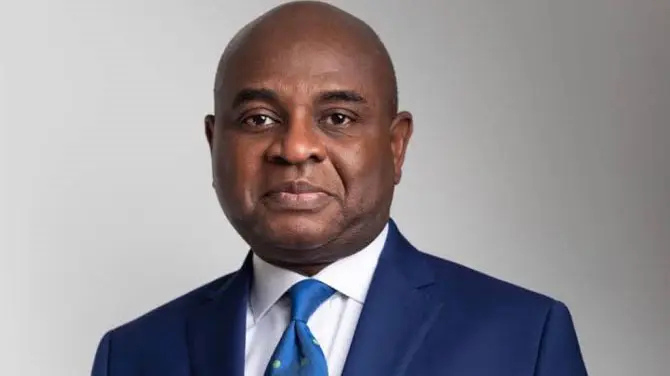Former Deputy Governor (Financial Stability) of the Central Bank Nigeria (CBN), Kingsley Moghalu, has weighed in on Nigeria’s economic challenges, advocating for decisive actions to steer the nation towards stability and growth.
Addressing the theme, ‘An Economy In Distress; Which Way Forward?’ at the 16th Edition of LEADERSHIP Annual Conference and Awards in Abuja on Tuesday, Moghalu outlined key reforms imperative to stabilize Nigeria’s foreign exchange and foster economic resilience.
He proposed a nuanced approach to stabilizing foreign exchange, suggesting the careful consideration of a $20-30 billion stabilization package from the International Monetary Fund (IMF).
Moghalu underscored the importance of weighing the potential benefits and drawbacks of such a move.
Furthermore, the ex-CBN governor emphasized the necessity of forming a full-time, highly professional Economic Advisory Council comprising seven economists specializing in critical sectors such as agriculture, industry, labor, business, trade, fiscal policy, and development economics.
This council, he believes, would offer strategic insights crucial for economic transformation.
In addition to these measures, Moghalu advocated for the strategic sale of government assets to raise funds totaling $18-20 billion, which could be channeled into bolstering foreign reserves.
He stressed the urgency of President Tinubu assembling a proficient economic team dedicated to driving transformative policies.
Highlighting the pervasive impact of corruption on Nigeria’s governance landscape, Moghalu urged for concerted efforts to combat corruption and implement robust social security systems aimed at alleviating poverty nationwide.
He called on President Tinubu to overhaul his cabinet and embrace the 24-point private sector Bill of Rights to foster a conducive environment for investment and business growth in Nigeria.
Moghalu emphasized the imperative of strategic thinking and long-term planning to effectively address Nigeria’s economic crisis.
He underscored the need for prioritizing effective governance and meritocracy over corruption, tribalism, and mediocrity to enhance the country’s economic prospects.
Moghalu’s insights come at a critical juncture as Nigeria grapples with multifaceted economic challenges, underscoring the urgency for bold and visionary leadership to chart a sustainable path forward.






